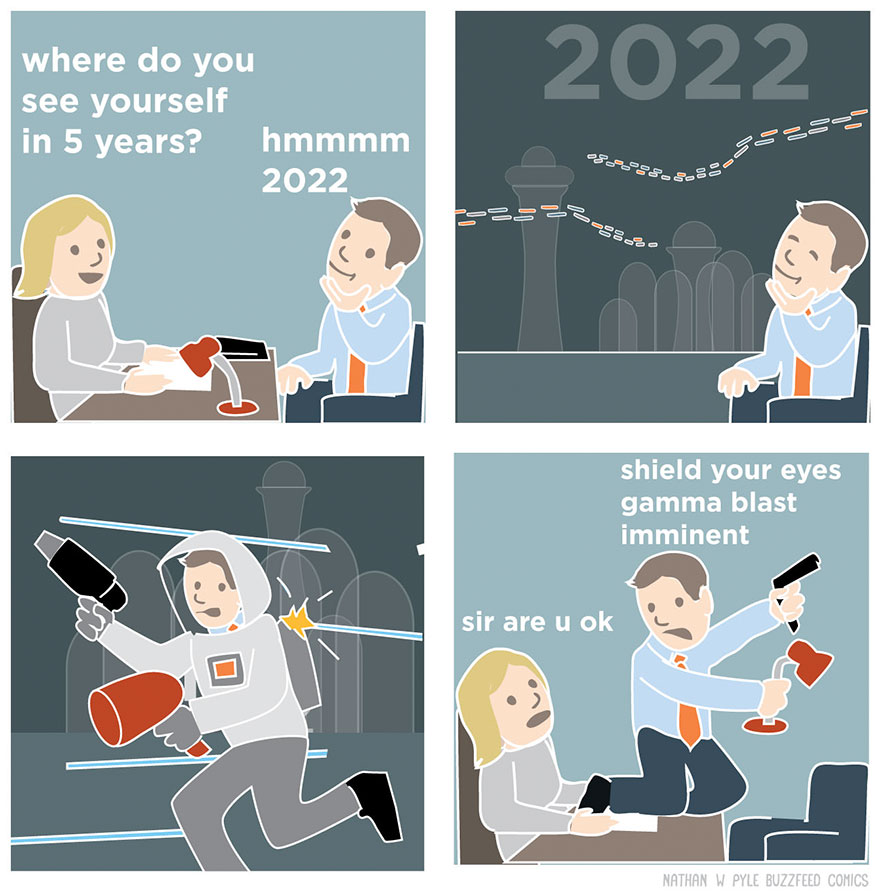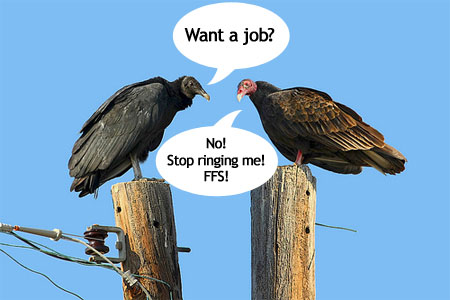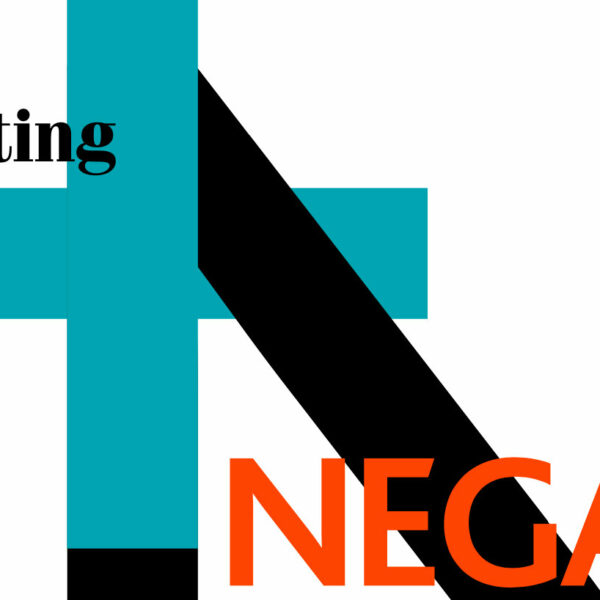Recruiting for and interviewing Digital Project Managers is a tricky thing. The main reason for this is, despite our digital industry becoming mature in many ways, the digital project management side of things is still relatively new in terms of speciality.
My first tip would be to apply extreme negative feedback tactics in any interview – DING DING DING!
But if you think your HR department may have an issue with this approach, read on…
Finding a good and experienced Account Manager isn’t to difficult and these folk can expertly handle clients, likewise, it’s getting comparatively easier (as opposed to the days when it was either Web Designer or Web Developer) to find creative and technology specialists such as UX Designers and Mobile Developers – however when it comes to digital project management there still seems to be a little bit of a gap finding people who can not just manage projects, but manage digital projects.
The reason for this I believe is because a Digital Project Manager really needs to understand the complexities of digital projects in order to run them well, and although not necessary, having experience in a wide range of digital skills is advantageous.
However, as well as being experienced to some extent in digital production, it’s still vitally important that a Digital Project Manager also has commercial awareness, business acumen and more traditional skills associated with project management and account management – it’s finding people with this mix that seems to prove especially challenging.
So let’s assume your job advert is out there, the recruitment vultures are circling and you’re getting swamped with CVs – once you get a candidate in how do you assess if they have the right skills? Well, you start by asking questions that aim to dig into the dark art of digital project management.
Below is a list of Digital Project Manager or Digital Producer interview questions, as well as the answers I look for.
How would you approach starting a new digital project that has been sold?
I want to hear their process for starting a digital project where they weren’t involved in any of the pre-sales phases.

For example mine would be… read through all sold project docs, introduce myself to client and go through the project requirements again with client.
When I have a solid idea of the digital project, I’d take the proposal / sold work, with any new requirements, and break it down into more detailed phases and tasks, including any planning, go-live, testing etc.
I’d then get the whole thing estimated by the best people (the people who will be doing the work), and if there are any differences in the sold budget versus the new estimated hours, I’d work with client to align the two, either by getting more budget, changing daily rates, decreasing scope of features etc.
Once both parties were happy, I’d confirm the tasks, phases and hours with the client, then create a project schedule for approval.
An experienced Digital Project Manager could very well then proceed to talk through the rest of the entire project, and for bonus points, they’d also illustrate how they’d work with the agency team to shuffle resources accordingly to hit payment milestones demonstrating their commercial awareness regarding internal cash flow.
What digital project management methodology do you swear by? Agile, Waterfall?
The only viable answer here is “it depends”. As a Digital Project Manager, you have to be flexible and adaptable when it comes to the best way to run a digital project. Sometimes Agile is best, other times it’s Waterfall and more often than not it’s a hybrid solution that works best.

A multitude of factors can dictate which methodology is most appropriate. Often when working with enterprise-sized clients they may well insist on a PRINCE2 full-on Waterfall approach as that’s how they run their digital projects internally and anything else would be too alien for the organisation to buy into.
However, it could be that the organisation is open to methodologies, but the Digital Project Manager chooses to implement a Waterfall approach because of the number of stakeholders and internal departments that will be involved i.e. it’s the lowest risk approach.
Agile could be adopted where the solution being delivered is an internal application not aligned to any critical deadline enforced by the client and quick response regular feedback loops are practical, as well as tolerance in directional changes based on the feedback.
A hybrid digital project management approach can be effectively used to deliver a solution when it’s critical to both agency and client that phases are signed off, but it’s advantageous to both to allow scope changes all the way through the project.
The important point is that it really does depend and a good Digital Project Manager will be able to identify early on which approach will be best and have the skills to stick to it so all of the benefits of that approach for that digital project are felt.
Any Digital Project Manager who insists that one methodology is better than another is limited or naive i.e. someone who religiously advocates Waterfall may well have great corporate experience but little small to medium experience and may struggle when not protected by processes.
However, an Agile purist may be great at managing application development, but not so skilled in dealing with larger clients unfamiliar with these ‘new fangled hippy’ approaches.
In the past, have your digital projects come in on time and on budget?
I would prefer to hear a “not all of them no, but most” kind of answer. This is one way to see how honest they are.
When someone says all their digital projects have come in on time and on budget it makes me a little suspicious, after all, can anyone who’s been in this game for a while really say that!?
To me, saying everything always goes well means they’re either inexperienced or not the best at telling it how it is when the temptation is to sugar coat- a key attribute for a Digital Project Manager in my opinion.
Telling an interviewer that not all your digital projects come in on time or on budget can be turned into a positive by proceeding to give one or two examples and the reasons why things didn’t go quite to plan.
This is actually a pretty decent way for a Digital Project Manager candidate to assess their potential new boss as well. I mean if the new boss grimaces at hearing this, chances are he or she is going to be a right pain to work for. In my experience a good boss expects some digital projects to go wrong, with the important thing being that it’s known why and lessons are learnt so the chances of making the same mistakes again are minimised.
How do you deal with a situation where a task has gone over budget?
Here I’m firstly looking to hear how this situation may have arisen in the first place, and if they’d kept both their boss and the client informed regularly enough so that it wasn’t a surprise to either.
Then I’d want to hear what they’d do next e.g. how would they explain this to the client, would they look at ways to reduce or cut tasks not yet completed in order to bring the total budget back on track – or if they had to ask for more budget, how would they approach this with the client?
Can you give me some examples of projects you’ve run and describe your involvement?
Here I want to see if they are a ‘hands on’ Digital Project Manager or not. This question is a spin-off of the classic realisation that when someone says they worked for Coca-Cola it transpires they once created a static banner for one of their microsites in 2001.
Too many will say they ran this and that big important digital project, but when you dig deeper you find out they just co-ordinated it rather than managed it – a big difference.
Some Digital Project Managers, especially in larger agencies, are actually just task delegators. This may not be their fault as that is how many organisations are structured, however, better to just say this and that you’re looking to increase your skills than try to hide it.
Ideally, I’d to hear how they helped come up with creative and technical solutions with their teams, managed the client as a primary contact, scheduled the entire project, worked with their bosses throughout, briefed creative and technical teams and tracked progress etc.
What resources do you use to keep up to date with digital trends and digital project management?
All I’m looking for here is to identify if the candidate is passionate about the web or not. I prefer people that clearly really love the web and look at it outside of work hours. They don’t have to be web mentalists, but I don’t tend to hire people that just want a ‘9-5 job’ who used to be an Account Manager with little or no digital knowledge.
I have more notes for this post, but I want to hear from you…

What questions have you personally been asked in interviews and what do you think are the key questions to ask a Digital Project Manager candidate?










Spot on, Sam. Unfortunately (or luckily depending on your point of view) it’s sadly all too easy to see the good web PMs from the bad – we’ve been looking for 6 months and haven’t found the right combination. Had the “yes, always on time and always on budget” response from most, which is usually always met with a raised eyebrow, but now I’ll keep a typewriter handy.
@Graham, haha definitely keep a typewriter handy. What other questions do you tend to ask potential Web Project Managers in interviews?
Great article Sam and one I’ll pass along to PM’s that are currently looking for a new web project. We’ve had a number of organisations in this space looking for PMs – and yep we’re not all vultures :)
As you mentioned in your post near the beginning – its the client facing skills that matter alot of the time – especially ‘commercial awareness’. Interview questions that probe (ouch!) this are particularly good – prehaps legal understanding, managing change requests, resolving conflicts – those kinds of things.
Good stuff Sam
Sam
You have omitted one of the key situations that a PM faces. The fixed cost sale. On most occasions, the actual gift of a Web PM is to do everything you have described AND do it for £3.86 as that’s what the sales team have sold.
They have over sold and underpriced your fabulous work. The result: you are already on the back foot, have to inevitably change the spec and so you already have a dis-satisfied client, from the off.
One of the key skills when I was evolving as a Web PM, was to get into the Pre-Sales as early possible, even to the point of not agreeing to take on a project, unless I’d had some influence on the pricing.
You need to train your sales team not to shaft you, before you even start.
Colin
@Lindsay, awwww apologies for the vultures association, this was directed at ‘those’ ones who really are just scum :)
I feel like I’ve been saying “commercial awareness” for far too long now but it’s so often a technical person’s weakness, and technical the weakness for commercially aware people – both types will often lead you down a path of pain in web project management.
The technically-biased Web Project Manager will provide a fantastic solution, but will often not spot new opportunities for account growth, deliver an over the top solution that the client doesn’t really need and isn’t as financially appropriate for their own agency etc.
A commercially aware but low-tech person tends to be great at handling clients but will often grossly over-promise and over-sell solutions based on inadequate technical knowledge.
One solution to this is to pair an experienced account manager type person with a senior technical person, however while this can work fantastically, it does mean paying two people, and even if working closely, can often cause ‘crossed wires’ problems as both can’t always be involved in every single mail, telephone call or meeting.
@Colin, this is a very good point. I’ve lost count of the number of times I’ve been handed a web project freshly sold only to scream in horror at what’s been promised, for what price and deadline.
For years I was bitter about this situation until I realised I could do nothing to stop it altogether. Yes I always tried to get involved in the pre-sales and this does help, but sometimes you just can’t get involved.
Instead one has to realise there was is real art to taking these projects on and building a relationship clients despite having to start off negotiating scope, price and deadlines on something they only just agreed and paid for – but it can be done – and you can use poorly sold work to your advantage sometimes e.g. if someone sells a “Blog” feature for £xx but with not much more detail, you can start to talk to the client about if they really need an all singing all dancing blog as we know it etc. Or when sold for a cheap price, you can try to utilise free third-party solutions that meet the client’s requirements without seemingly going back on your agency’s promise in the sale.
But you’re right, this is a good question to ask as it’s one of the trickier situations a Web Project Manager will have to deal with at some point in their career.
You make some great points. One word of caution I would offer: it is possible to deliver all your projects on time and on budget if you are 1) experienced and 2) deal with the same type/size of project consistently. If you manage to bring in that unusually complicated large redesign on time and on budget you have benefited from a bit of luck to compliment your extensive experience. I wouldn’t discount someone who said that they consistently meet the deadline within budget. I was glad to see you state you would probe deeper to find out if they have the knowledge and background to back up their claim. You could miss out on a great PM if you just assume they are sugarcoating the truth.
@Tonya, thanks for your comments. I would indeed dig a little deeper into anyone saying they always deliver on time and on budget, but you make some valid points for sure – first dig deeper before making any judgements.
Hi thesambarnes,
Your website is really good. I just went through it because I have an itw for the position of Web Project Manager and there are a lot of useful information here. Nice work.
I have a question though. What will be the average salary for this position for someone new in this field? I only have experience in web design as a freelance, marketing, IT and audiovisual background.
Any idea what question I can get during the interview as I was not a WBM before or Web Developer? This is not covered in your article.
Thanks for the info.
@supergex, thanks for the compliments. Salary of course can vary massively between locations, experience, industry sector and many other things.
You sound like you’re just starting out and so it would be unrealistic to expect anything other than absolutely foundation level salary.
I found one way to get a good idea of what you can expect is to simply trawl through job sites and find jobs you think you could genuinely do. Use different keyword phrases as often the same kind of jobs are advertised with lots of different job titles e.g. search for web project manager, digital project manager, web producer, digital account manager, digital producer – and so on…
As you find junior level jobs that have descriptions that you think you could do, you’ll probably start to get an idea of ‘what you’re worth’. Search inside big cities and also outside – if I did my exact job as I have now, but did it in London instead of where I am, I would probably earn up to 30% more – so don’t get sucked into thinking you should be paid X when the location means you should really get Y.
As for questions based on your experience – I guess they would be to assess two things: your web experience and management / commercial experience i.e. although you’ve not been a developer or Web Project Manager before, could you potentially do the job?
You’ll need to demonstrate your web design knowledge just so they can see you have a good grasp on the basics e.g. understanding the website / app design and build workflow. Then you’ll need to show you have an understanding of the commercial side of business and that you can manage people.
I hope this helps.
Great site and an awesome blog post, Sam!
@John, why thank you sir :)
My additional question: ‘Tell me how you manage your resources? How do you deal with conflict between your resources that threatens to push the project over budget?” Not all teams are cohesive or homogeneous, and internal issues can hold things up as much as client-facing conversations/scope creep/ revisions & approvals. Great article and very helpful.
@Susan, that’s a good one about teams and I’ve been asked that before :)
Excellent post @Sam… I am quite shocked I have only discovered your site. It would be nice if you installed a plugin called follow me. I for sure will be happy to get updates on every new articles posted.